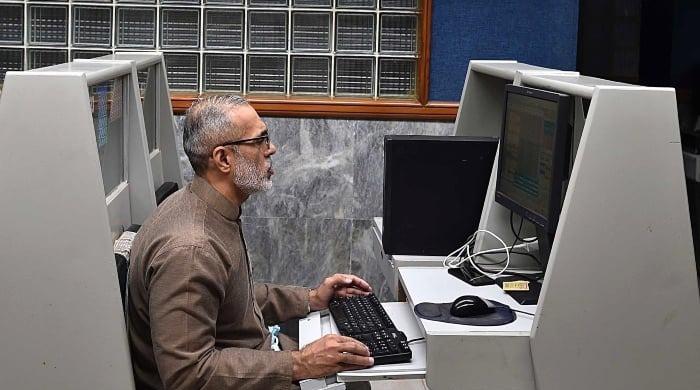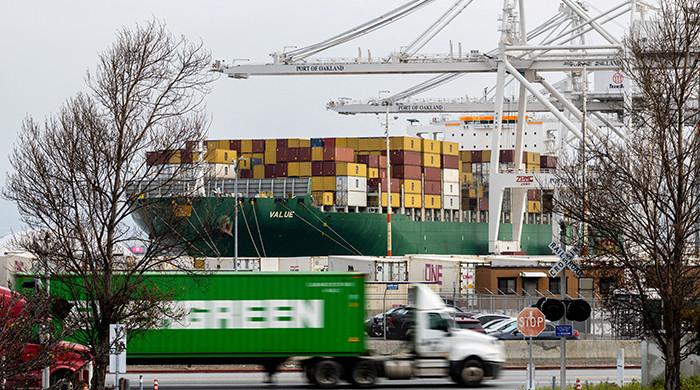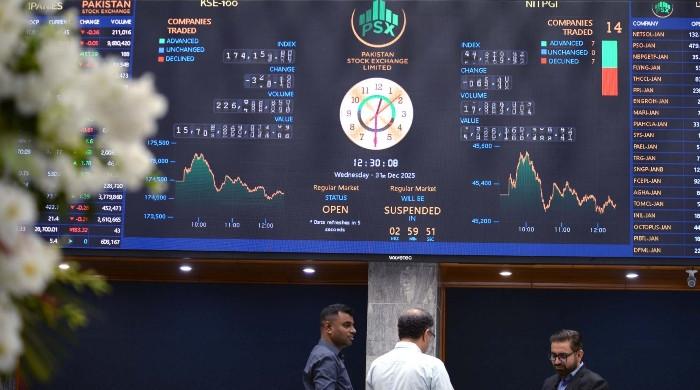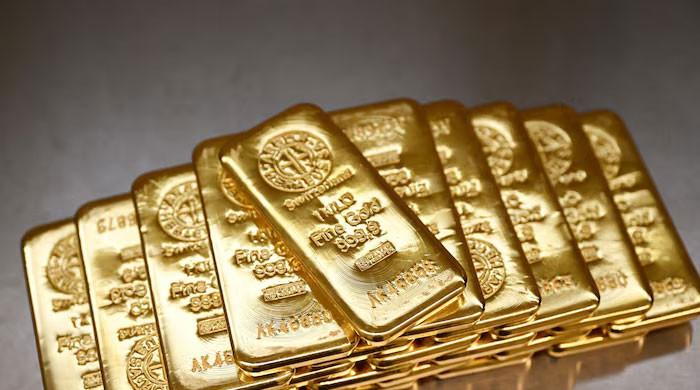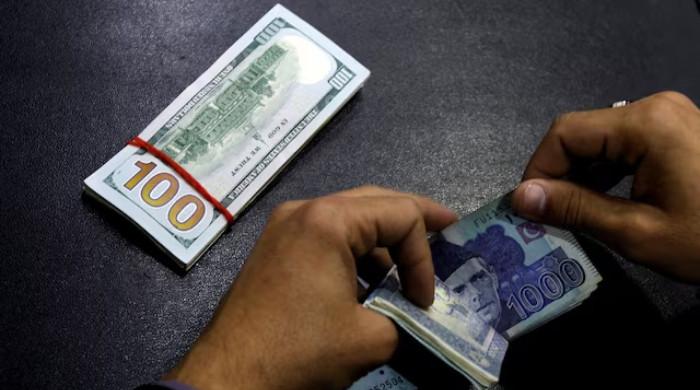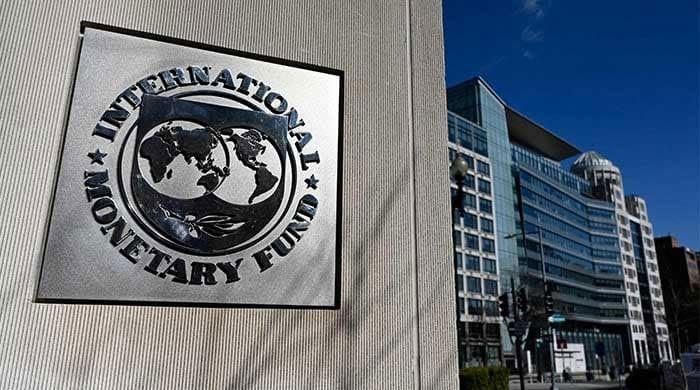Pakistani, global stock markets sink on speculation, panic over coronavirus
International oil prices tanked significantly amid fears that the coronavirus could devastate the world economy
February 28, 2020
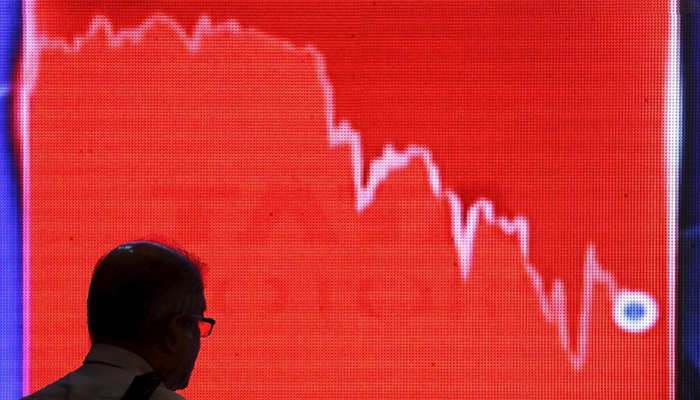
KARACHI/LONDON: Panic over the spread of coronavirus severely hit global stock markets on Friday, setting the stage for what will be the worst week since the 2008 financial crisis and bringing the global wipe-out to $6 trillion.
International oil prices also tanked significantly this past week amid fears that the coronavirus could devastate the world economy as supply chains were disrupted, travel plans postponed, and major events cancelled. The fears were compounded by airlines grounding their planes and suspending flights to coronavirus-hit countries.
This week, oil prices fell for five consecutive days, registering a 5.63% downfall, having earlier dipped from $60 to $50 and lower.
Pakistan's benchmark stock index — heavily weighted by oil stocks, such as Pakistan Petroleum Limited (PPL), Oil and Gas Development Company Limited (OGDCL), and Pakistan Oilfields Limited (POL) — also felt the impact of this week's negative pressure in oil prices.
Hammad Aman, the head of sales at KASB Securities, told Geo.tv that panic in the local stock market was observed at the start of the week and it grew when news of the first coronavirus case broke on Wednesday. By evening the same day, investors had started pulling out from mutual funds and markets opened in the red on subsequent days.
Sell-off, expansions halted
A research analyst at a Karachi-based investment company echoed the sentiment. "The general fear in equity markets is that prolonged curfews and supply-chain disturbances can cause a decline in aggregate demand," said the analyst, who declined to be identified as they were not permitted to speak to the media.
"This generally leads investors to switch from riskier assets — that is, equities — to safer ones, such as treasuries and gold. We have been seeing that trend recently in Pakistan," they added.
The analyst explained that worries at the PSX were similar in nature. "A few companies that were engaged in capacity expansion investments had to delay their plans as their Chinese plant and machinery suppliers could not make good on their end," they noted.
Aman, the KASB official, explained how there was a major sell-off during the past week.
Cheaper oil, more barrels
"For the first four days — Monday to Thursday — foreign investors sold shares worth $16.1 million whereas locals sold off $11.1m in mutual funds," he said, adding that Pakistani investment companies consequently bought $19.1m of the total that was earlier sold off by investors.
"Moreover, being an oil-importing nation, Pakistan is technically not paying for the imported oil at the moment. It has $3 billion from Saudi Arabia [as foreign currency support], which is why there has been no outflow.
"However, the cheaper the oil is in international markets, the more barrels Pakistan can import from the fund," the KASB official noted.
On the other hand, petrol is currently being sold in Rs117 in Pakistan but, according to Aman, there are talks of slashing per-litre prices by Rs20-25.
'Markets react to expectations, news'
Realistically speaking, however, a reduction of Rs8-10 a litre could be expected in March 2020, he said, adding that it would bring down inflation from 14.6% in January to a forecast of 13-13.25% — the same as mentioned by Planning and Development Minister Asad Umar earlier this month.
With petrol being linked to everything, a cut-down in inflation outlook and monetary policy set to be released in March, this may be a sign of hope, but has little bearing on what’s presently going on.
"Markets react to expectations and news way before something actually happens, which has caused the ongoing panic and downturn," he added.
Around the world, nevertheless, the stock market in Germany's Frankfurt headed the losses in Europe, diving more than 5% at one point in the morning deals. Leading European stock markets have tumbled around 12% in just a week, while London's FTSE 100 is back at levels seen in late 2018.
'Fear' index at highest
"Stock markets are well on their way to their worst week since the global financial crisis," said Craig Erlam, a senior market analyst at Oanda trading group.
Stock markets in Shanghai, Sydney, and Tokyo all closed down 3%, while Jakarta shed more than 4%.
On Wall Street, the Dow on Thursday suffered its biggest points loss on record, shedding almost 1,200 points, while its 4.4% drop marked the worst performance in two years.
The S&P 500 and Nasdaq also slid more than 4%, while the VIX "fear" index is now at its highest level since the European debt crisis erupted in 2011.
'Longer-than-expected negative impact'
"The panic mode is full on," said Ipek Ozkardeskaya, a senior analyst at Swissquote Bank.
"The coronavirus outbreak has certainly hit businesses, and it might have a longer-than-expected negative impact on company earnings and global growth," she added.
Elsewhere Friday, the Japanese yen continue to benefit from its status as a haven investment in times of economic unrest, making solid gains against the dollar.
Concern that global crude demand will crash meanwhile sent oil prices to their lowest levels in more than one year after diving more than 4%.
"Another day, another sell-off," remarked analyst Stephen Brennock at energy consultancy PVM Associates. "Risk assets took a significant step lower... as market players continued to squirm with unease over the growing coronavirus crisis."
'Little any central bank could do'
Investors were meanwhile keeping an eye on central banks, particularly the US Federal Reserve, in the hope of monetary easing measures, while governments are faced pressure to provide support.
"However, beyond helping to alleviate the current stock market collapse, there is little any central bank could do to alleviate the potential repercussions of a global pandemic," noted Joshua Mahony, a senior market analyst at IG.
Indeed, Bank of England governor Mark Carney on Friday told Sky News that at this early stage it was "hard to be precise about the magnitude" of the virus and its economic impact.
"We would expect world growth would be lower than it otherwise would be," he concluded.
Companies cancel events
The virus has proliferated around the globe over the past week, emerging in every continent except Antarctica, and prompting many governments and businesses to try to stop people travelling or gathering in crowded places.
The Geneva International Motor Show was the latest major event to be cancelled Friday after Switzerland banned large gatherings.
Separately, Facebook late Thursday scrapped its annual F8 developer conference "to prioritize health and safety" of employees and participants, its director of developer platforms and programs, Konstantinos Papamiltiadis, confirmed.
The virus has killed more than 2,800 people and infected more than 83,000 worldwide — the vast majority in China — since it emerged apparently from an animal market in a central Chinese city in late December.
On Friday, Nigeria reported the first new coronavirus case in sub-Saharan Africa, as the World Health Organization (WHO) warned against the "fatal mistake" of complacency.
Key figures around 1045 GMT
London
FTSE 100: Down 3.1% at 6,584.68 points
Frankfurt
DAX 30: Down 3.6% at 11,920.65
Paris
CAC 40: Down 2.9% at 5,335.24
Milan
FTSE MIB: Down 2.8% at 22,151.40
EURO STOXX 50: Down 3.4% at 3,339.80
Tokyo
Nikkei 225: Down 3.7% at 21,142.96 (close)
Hong Kong
Hang Seng: Down 2.4% at 26,129.93 (close)
Shanghai
Composite: Down 3.7% at 2,880.30 (close)
New York
Dow: Down 4.4% at 25,766.64 (close)
Exchange rates
Dollar/yen: Down at 108.80 from 109.59 at 2200 GMT
Euro/dollar: Up at $1.1031 from $1.1001
Pound/dollar: Down at $1.2885 from $1.2887
Euro/pound: Up at 85.61 pence from 85.36 pence
Oil prices
Brent Crude: Down 2.8 percent at $50.71 per barrel
West Texas Intermediate: Down 3.9 percent at $45.25
—Additional reporting from AFP and Reuters




